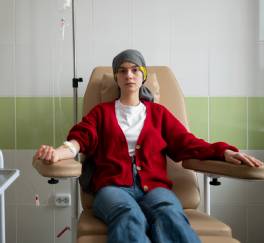 Book Appt.
Book Appt.
 Call Now
Call Now


Introduction
Fanconi anemia (FA) is a rare genetic illness that affects the bone marrow and other regions of the body. The spongy substance in the centre of your bones, known as bone marrow, produces stem cells that differentiate into red and white blood cells, as well as platelets. If you have Fanconi anemia, your bone marrow does not produce normal blood cells and platelets. People with FA are more likely to develop blood problems and some types of cancer. FA also creates physical anomalies, which can harm people's organs and appearance. People with FA-related blood diseases are living longer and with fewer medical concerns because they can receive bone marrow transplants.
Symptoms
Fanconi anemia impacts people in a variety of ways, beginning with our bodies' development during pregnancy. FA can produce symptoms associated with a variety of illnesses, including anemia, bone marrow failure syndrome, malignancy, and physical deformities. The signs of bone marrow failure syndrome are quite similar to those of anemia. Other symptoms include bacterial or fungal infections and excessive bleeding.
Causes
FA is a genetic condition caused by inherited mutations (discrete changes in genetic code) in a collection of protein-coding genes. We have approximately 20 FA genes, however, not all of them are impacted by gene mutations. FA genes safeguard us from DNA damage that occurs during life. When FA genes change, proteins that normally repair regular DNA damage do not function properly and cannot repair damaged DNA.
Fanconi Anemia Diagnosis
Pediatric hematologists who specialize in Fanconi anemia can provide a diagnosis by doing a comprehensive physical, medical, or family history, and current symptoms. Conducting blood tests to screen for low white blood cell, red blood cell, and platelet counts, among other issues.
Doctors employ specialized tests, including genetic studies, to confirm a diagnosis of FA. The chromosomal breakage test is the gold standard in specialized testing. Genetic studies can assist in determining which altered gene is causing the condition.
Treatment
Children with Fanconi anemia require lifelong care and monitoring. The care team will create a treatment plan that is unique to each individual. This will help detect and treat complications from the illness. This will include a yearly check-up, blood tests, and bone marrow testing (typically beginning at age two) to see how FA affects the child's bone marrow. The doctor may also propose checking the function of important organs (such as the kidneys and heart) to rule out any issues. Commonly used therapies for bone marrow loss due to FA include:
Transfusion support (e.g., blood and platelet transfusion)
Granulocyte-colony stimulating factor (G-CSF) is a growth factor that helps increase white blood cell count.
Androgen is a type of male hormone. Androgens can promote the production of red blood cells and, in many cases, platelets. This sort of therapy is effective for some people, but not for all. Androgens can help to maintain or improve blood counts over time. It's not a cure. It can have unfavorable side effects.
These options are used only temporarily while the care team develops more definitive treatment plans.
Bone marrow transplantation is the only potentially curative therapy available right now. BMT is a technique that eliminates harmful stem cells in a patient's bone marrow. The damaged stem cells are replaced with healthy, blood-forming stem cells obtained from a donor. When a child's bone marrow failure progresses to the point where transfusions are necessary, the care team may prescribe BMT. They may also suggest BMT if the child develops myelodysplastic syndrome or leukemia. This treatment is also known as allogeneic hematopoietic stem cell transplantation (HSCT).
BMT can treat blood problems caused by Fanconi anemia. It can also reduce the child's risk of developing myelodysplastic syndrome and leukemia due to Fanconi anemia. If those issues have already arisen, BMT can address them. Bone marrow transplants for persons with Fanconi anemia are complicated and specialized. They should take place in a specialized centre where experts have extensive knowledge and experience in this field of medicine.
Even after a successful BMT, patients with Fanconi anemia are more likely to develop solid tumors in the head, neck, and genitalia. People with Fanconi anemia should be monitored by their healthcare team for the rest of their lives.
Other specialized therapies and surgeries for people with FA
People with FA may require additional types of care, such as cardiac surgery to address heart defects, orthopedic surgery to fix skeletal difficulties, therapies for gastrointestinal, kidney, or other disorders connected to Fanconi anemia, and hormone therapy to manage poor growth, thyroid conditions, and diabetes. The treatment team provides educational and emotional assistance to patients and families to help them understand and cope with FA. Genetic counselling can also help.
Conclusion
Bone marrow transplantation (BMT) is an important treatment option for patients with Fanconi anemia, especially those who have significant bone marrow loss or haematologic cancer. The procedure consists of multiple carefully coordinated procedures, including donor matching, pre-transplant conditioning, stem cell collection, infusion, and strict post-transplant care.
SHALBY Sanar International Hospitals provides extensive medical procedures backed up with our state-of-the-art technology and a team of highly qualified & experienced clinical experts.
Our doctors pen down their research findings and experiences from time to time. Their words provide deep insight into the latest techniques, technologies and other advancements in healthcare. It provides expert answers to all kinds of health questions for real-life issues.
VIEW ALL



.jpg)
Since the day of its foundation, SHALBY Sanar International Hospitals is committed to provide comprehensive healthcare services. It regularly organizes awareness programs in its premises and encourages outdoor healthcare activities and camps with an intent to put focus on preventive healthcare.
VIEW ALL